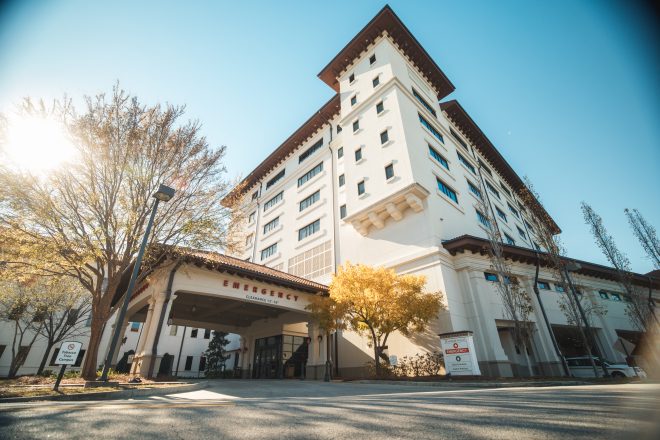Archbold marks oncology center’s 20 years
Published 10:26 pm Wednesday, June 11, 2008
For the past 20 years, the Lewis Hall Singletary Oncology Center at Archbold Memorial Hospital has offered “world class cancer care in a family setting.” When the oncology center opened on June 12, 1988, the diverse needs of the patient and the significant impact a diagnosis of cancer may have on a life was firmly recognized. With this in mind, a commitment to provide the highest quality cancer treatment in a caring environment began.
Keenly aware of the physical and emotional aspects of the cancer treatment process, Singletary was intent on establishing a local facility to aid the community and surrounding areas. A generous gift from Mr. and Mrs. Lewis Hall Singletary was the foundation for construction of the region’s first comprehensive cancer center.
The success of the facility is a product of commitment, team-work, careful organization, experience and hard work. The team of cancer professionals, led by experienced board certified oncologists and a physicist, includes nurses, pharmacists, therapists and counselors. This nucleus, along with the patient and the primary care physician, plan an individualized treatment strategy that best suit patient needs.
“We strive to keep the family atmosphere alive at the center by knowing our patients by name and not by a number. While offering this family setting, we also offer state-of-the-art, university-level treatment,” said Steve Johnson, M.D., radiation oncologist.
Personal service and a caring atmosphere are hallmarks that distinguish the Center’s cancer care program. The goal is truly integrated; it is accomplished with a full range of cancer treatment, rehabilitation services, nutritional counseling, and coordinated patient and family care offered in a single location. As treatment comprises only one step in the care process, the center continues to emphasize prevention and early detection of cancer through educational efforts and screenings throughout south Georgia and north Florida.
In addition to community education outreach programs — which include free screening and cancer prevention seminars, lectures to schools and civic organizations — Center staff actively participate in community events such as the American Cancer Society “Relay for Life.” This year, the Center raised $27,000; the highest in Thomas County.
The center has met its goal to become and remain approved by the American College of Surgeons as a comprehensive community cancer center. The approval by the College’s Commission on Cancer is the highest endorsement of an oncology program by the medical community and follows an intensive evaluation process of operations and staff, as well as a site visit. Less than 20 percent of hospital-based cancer programs in the United States achieve ACS approval. Standards of service include program components such as a tumor board, multidisciplinary cancer committee, ambulatory chemotherapy units and an active tumor registry.
When the Center opened, treatment technology included state-of-the-art equipment, such as a linear accelerator, radiographic fluoroscopic therapy simulator and a radiography computerized treatment planner. During the first year, the center treated 480 individuals with cancer. More than 5,700 individuals with cancer had been treated by the Center’s ten-year anniversary.
Through the years, the equipment has advanced with the growth of the oncology center. This growth has allowed the center to expand the scope of the programs and obtain additional medical professionals to provide the highest quality medical care and the latest technology. Along with the newest generation linear accelerator, the oncology center has initialized or enhanced programs in Gamma Knife (one of only four in Georgia, and the only site south of Atlanta), Mammosite, Gliosite, prostate seed implantation, combination chemoradiation and HDR brachytherapy—creating a diverse array of programs rivaling many university hospitals.
In the past twenty years, the Center has treated and touched the lives of more than 11,500 new patients.
Early in 2007, the Center decided to evaluate the need for growth and change to better equip the center in the present and to prepare for the future. “We want a strategic plan that will enable us to prepare for the growth we’re expecting to see in our oncology program,” said President and CEO Perry Mustian. “It also must address the incidence of cancer in our service areas that is not being detected early enough for effective treatment.”
“At the national and state level, the incidence of cancer diagnoses is increasing,” said Holly Young, RN, BSN, MBA, Director of Oncology Services and Integrative Medicine. “Currently the center provides over 4,000 radiation and medical oncology treatments each month, which has greatly taxed our limited space.”
Southwest Georgia has higher rates of cancer than most parts of the state; therefore, the need for treatment is high.
As a result of the strategic planning effort, a decision was made to build a new oncology center to replace the existing 13,000 square-foot facility. With a projected open date of mid-2010, the new oncology center is expected to be around 40,000 square feet, providing a unique and spacious healing environment for patients. The center will be located next to the existing hospital campus and will integrate radiation oncology, medical oncology, and offer even more expanded patient support services.
“We want to reach more people, and we want to reach them earlier in their disease, when treatment is most effective. We also want to do more to help them cope with the side effects of treatment, including the emotional ones, and to ensure they receive all the follow-up care they need,” said Vice President of Clinical Services Ken Brooker.
“When the new oncology center opens, we will be able to provide many new programs for our patients, including patient navigator coordinators that will teach diagnosed patients about cancer, rehab fatigue and energy management — as well as support groups, survivorship programs, and a continuum of wellness for patients who have completed treatment,” said Young.
“It’s remarkable how cancer care has changed in the last 20 years,” said Mustian. “It’s also impressive how our staff has consistently made progressive, patient-focused decisions about treatment and technology. A clear example of this focus is our goal to establish a comprehensive regional oncology center designed to meet patient needs for decades to come.”





